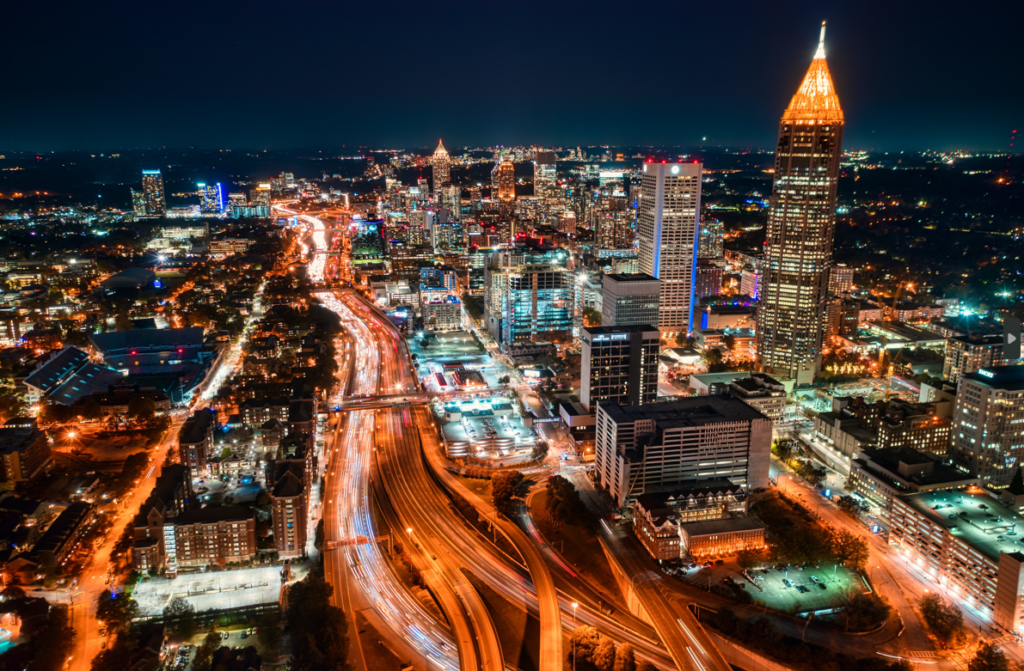The Federal Transit Administration has about $4.5 billion available in 2024 for transit projects of all types. This includes bus rapid transit projects, light rail, and commuter rail initiatives. While most of the projects involve state Departments of Transportation, the projects are local and require collaboration between the jurisdictions. The upcoming projects will all be large and diverse. Upcoming projects outlined in today’s column are all related to rapid bus transit efforts. It is advisable, however, to check with each state of interest to see what other types of transit projects are also in the process of planning and design.
MARTA, the public transit authority in Atlanta, Georgia, is currently seeking designers and engineers to help finalize plans for the construction of a new 15.5-mile rapid transit bus route. The new route, with 13 total station areas, will add many new connections, including shopping malls and a medical center. The buses that will shuttle passengers on the new route daily are high capacity and very fast. The estimated construction cost of the new route is projected to be about $338 million.

Downtown Atlanta at Night, Photo by Venti Views on Unsplash
MARTA also has a project in the works to transform Five Points Station in Downtown Atlanta for $260 million. This project is in the design phase, with construction solicitations set to be issued in the coming months. Construction will start in 2024. The current station is covered by a brutalist structure, which will be removed and replaced with an open canopy. Additionally, the station plaza and concourse level will be redesigned to increase accessibility, improve wayfinding, and allow more light and air to reach them. This project received financial support from the federal Rebuilding American with Sustainability and Equity (RAISE) grant program.
Denver, Colorado’s Colfax Corridor, is undergoing a significant transformation with the installation of a $250 million Bus Rapid Transit (BRT) system. This initiative covers 5.5 miles of dedicated center lanes and another 3 miles of operating in mixed traffic. Designs are currently being finalized, with construction slated for 2024.
The BRT service is designed for 24/7 operations, offering buses every four minutes on weekdays during the day, every 15 minutes at night, and every seven minutes on weekends. The project includes station structures resembling those found in light rail systems, with raised platforms, canopies, seating, ticket vending machines, electronic displays and a distinctive arch design along Colfax Avenue. The project follows years of planning, community input and a comprehensive analysis of corridor needs, resulting in a preference for the center-running BRT design. Buses should be running the route by early 2027.
Transit officials in Las Vegas, Nevada, are gearing up for a shift in public transportation as they launch the Maryland Parkway Bus Rapid Transit (BRT) Project. This effort carries a cost estimate of $305.01 million. Federal funding will
The project includes 50 enhanced transit shelters, dedicated bus-bike lanes, widened sidewalks, signalized pedestrian crossings, landscape enhancements and new lighting. The Maryland Parkway corridor serves 90,000 residents and boasts an average daily capacity of 9,000 riders and 35,000 vehicles. This extension of the 13-mile route from Maryland Parkway to the South Strip Transit Terminal and Las Vegas Medical District is welcomed as it improves connectivity for millions.
The RapidRide J Line project in Seattle, Washington, will renovate bus routes and amenities at a cost of approximately $120 million. This route connects downtown Seattle to the neighborhoods of Belltown, South Lake Union, Eastlake and the University District.
The project will include repairing more than 15,000 feet of sidewalks, repaving two miles of roadway, adding 3.7 miles of protected bike lanes and creating 2 miles of bus priority lanes. Additionally, various signage and road configuration improvements will be made, along with improving 177 crosswalks and replacing 253 traffic signals. One element of the project in which community input played a large role is the tree canopy maintenance along the route. This project will require planting approximately 200 new trees to meet community concerns. This project recently completed the design phase and RFPs for construction services are expected in the coming months.
The Lowcountry Rapid Transit project in Charleston, South Carolina, is a groundbreaking public transportation initiative, marking the state’s first mass transit infrastructure venture. a 21.3-mile bus rapid transit route will be constructed to cover the busiest corridors in the state, offering a welcome solution to the region’s growing traffic and connectivity challenges. With federal funding of $375 million secured and anticipated local matches from Charleston County’s sales tax, the project is slated for construction to begin in 2026.
In June of 2023, the U.S. Department of Transportation awarded the Connecticut Department of Transportation $25 million in funding to support the construction of a new bus rapid transit (BRT) system in New Haven. The $25 million will be combined with additional grant funding to complete the city-wide transit project, which carries a total cost projection of $150 million.
Project components include creating 18 new bus stops and four mini-hubs across New Haven. The four mini hubs will be designed to offer shelter, seating, and scheduling information. Additionally, the city will purchase 15 electric buses within the project. Some transit routes will be significantly faster with the planned improvements. Currently, the city of New Haven is working closely with the state’s Department of Transportation on the design phase and construction is planned to begin in 2026.
Transit projects fall into the transportation construction and engineering category, but these large projects will also include many additional types of services. Professional design services, planning expertise, community outreach, technology, signage, equipment and landscaping are all destined to be in extremely high demand. Government contracting opportunities in 2024 will definitely be abundant.

As President and CEO of Strategic Partnerships, Inc., Mary Scott Nabers has decades of experience working in the public-private sector. A well-recognized expert in the P3 and government contracting fields, she is often asked to share her industry insights with top publications and through professional speaking engagements.
Tags: 2024 Transit Projects, Bus Rapid Transit (BRT), Charleston Lowcountry Rapid Transit, Community Outreach, Commuter Rail Initiatives, Denver Colfax Corridor BRT, Engineering Services, Federal Transit Administration, Five Points Station Renovation, Government Contracting Opportunities., Las Vegas Maryland Parkway BRT, Light Rail, Local Collaboration, MARTA Atlanta, New Haven BRT System, Seattle RapidRide J Line, State Departments of Transportation, Technology in Transit, Transportation Construction






 RSS Feed
RSS Feed